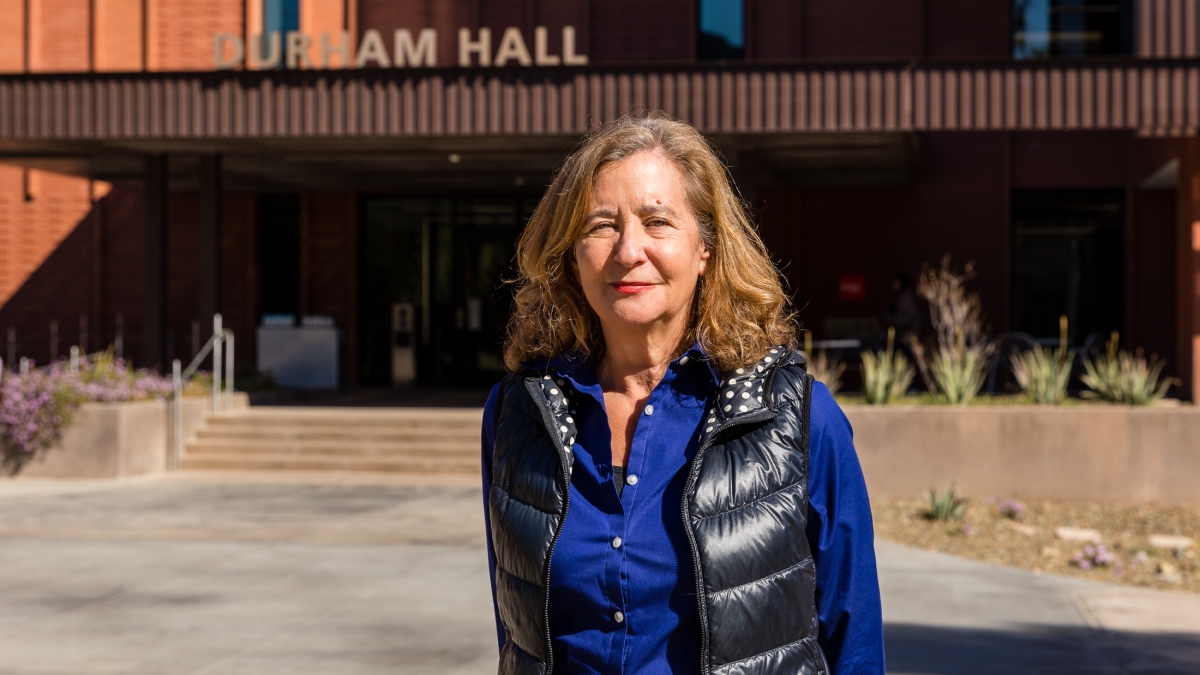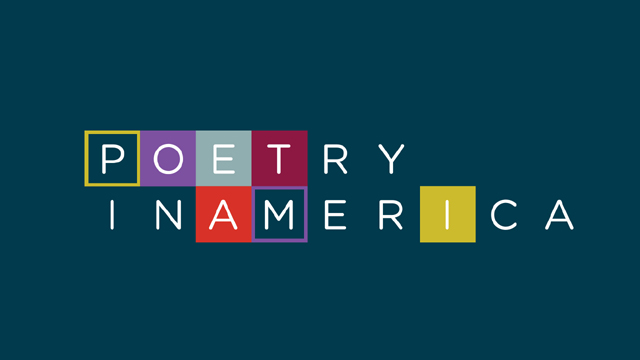April is National Poetry Month. Poet T.S. Eliot famously said that April is “the cruelest month.”
Arizona State University’s Elisa New might say April is the busiest month. That’s because the multihyphenate producer, writer, director and ASU distinguished professor of practice is also host of the PBS series “Poetry in America'' — part of a multi-platform educational initiative that “brings poetry into classrooms and living rooms around the world.”
This month, Poetry in America will host a public, in-person event to celebrate New's new base in Arizona. Registration is now open for the first-ever Poetry in America: Welcome to the West live experience. Hosted by Arizona PBS in downtown Phoenix on Wednesday, April 13, at 2 p.m., the event will showcase the most recent season on PBS and an all-star ASU faculty guest lineup that includes Alberto Ríos, Lindy Elkins-Tanton, and Jeffery Kennedy.
New’s academic home at ASU is in The College of Liberal Arts and Sciences, where she is director of the university’s Center for Public Humanities, which now administers the lauded national program. You could say that New puts the “public” in “public humanities.” She has turned her decades-long expertise in literary criticism and her excitement about new media to creating multisensory experiences in poetry.
Through a partnership with Learning Enterprise and others, the Center for Public Humanities enables high school students around the country to take ASU humanities courses for college credit. In the last two years, the program has reached over 3,000 students in 39 states.
Why poetry?
“What's the story here? But also: What's the visual story?” New asks herself when beginning to structure an episode of the Poetry in America television show. Viewers encounter these “visual stories” as they are guided through the verse in a mélange of images, textures and sounds.The effect is not disorienting or trite, but rather an unassuming, even joyful exploration of each poem’s many layers.
Poetry has gotten a bad rap as elitist, indecipherable, inaccessible. New’s mission is to combat these inaccurate representations and garner the art form a larger audience. She said that she does that by becoming a storyteller.
Most episodes feature a high-profile guest or two.
In Season 1, there’s Bono reading “Hum Bom!,” Allen Ginsberg’s Gulf War-era anti-war poem. Singer-songwriter Regina Spektor helps interpret Emma Lazarus’ poem inscribed on the pedestal of the Statue of Liberty, “The New Colossus.” Hip-hop artist Nas explores the lyrics to his iconic 1994 track, “N.Y. State of Mind.” And one Joseph R. Biden — then vice president — discusses a poem by Robert Hayden about fathers and sons: “Those Winter Sundays.”
“It’s very organic,” New said about how the show comes together.
The arc of each season is decided by the team asking the question, “How can we make the season really varied, really surprising, you know, give you some education in poetry without getting too pedantic?”
Sometimes the reader chooses the poem, and sometimes the poem chooses the reader. But, as New explained, each season does have a kind of content checklist. There’s a poem written before the 20th century, one that treats poetry as a performed art, and one about science.
In addition, New and her team make sure to include myriad voices: “We always want to be representing the full diversity of America's communities and the poetry that comes out of them.”
Finally, the show aims to present all this in an accessible way, with the viewer — not just the poetry — in mind.
There’s a bit of serendipity involved too.
An episode in Season 3 featured 2013 U.S. inaugural poet Richard Blanco and his poem, “Looking for the Gulf Motel,” in which Blanco looks back on his Cuban American childhood.
New recalled how one of the episode’s other special guests became involved.
“And Richard said, ‘Maybe have Gloria Estefan. I think she might do it,’” New said with a laugh. “And so he asked her (to join us on the show).” She did.
“And she added something extraordinary.”
Going west
Recently, the show has centered the experiences of Indigenous and Latino poets and the landscapes they inhabit, with an episode of the current season featuring Linda Hogan and ASU’s own Ríos. The move to ASU has made adding Western U.S. voices to the poetic conversation more opportune, though the impetus has always been there.
In 2020, New said, she had a kind of “taking stock” moment. She was the Powell M. Cabot Professor of American Literature at Harvard University. She had accomplished many of her professional goals and had built a thriving, model program. But she wanted to do more. She was still passionate about poetry and about sharing that passion with others.
“After having taught at two highly selective universities,” she said, “I really wanted to be, at this stage of my career, reaching wider populations of learners.
“There was a lot of scale possible.”
A friend told her, “You need to meet Michael Crow.” That friend introduced the two, and the pair spoke over the course of several months. New decided to pilot a scalable program at ASU during fall 2020. She officially joined the ASU faculty in fall 2021.
“Welcoming Dr. New to ASU as the director of our Center for Public Humanities marks an important moment in our community’s life and growth,” said Jeffrey Cohen, dean of humanities in The College of Liberal Arts and Sciences, where the center is housed. “Through Poetry in America in its various forms we are able to reach populations who love poetry already as well as many young people for whom the encounter will be transformative.
"If the humanities are to remain a vital part of our national identity, we need high-quality, widely distributed, accessible and engaging programs and courses like these. I’m especially proud that many students in underresourced schools will be earning their first college credits through Poetry in America – and these are ASU credits. If some of these successful students see themselves as future humanists as a result, then what could be better?”
New is bicoastal for now, splitting her time between ASU campuses in the greater Phoenix area and working with her longtime production staff on the East Coast.
New sees the Poetry in America television show as part and parcel of her educational efforts. Footage from the show finds its way into her educational offerings and also propels interest in these.
For New, it’s all personal, and she has every audience in mind.
“I want to be reaching 12-year-olds, and I want to be reaching experts, and I want the poets — the living poets whose work I bring to TV — to really think I've done a good job,” she said. “And so that keeps me working hard.”
The Poetry in America educational project is an initiative devoted to strengthening humanities education for learners from a wide range of backgrounds: college, high school and middle school learners, as well as educators. To this end, Poetry in America offers a suite of for-credit poetry courses through Harvard Extension School, including a professional development series designed for K–12 teachers, and a for-credit dual enrollment program through ASU. The Poetry in America for High Schools dual enrollment program is offered in partnership with the new ASU Center for Public Humanities, of which New is the founding director; ASU Learning Enterprise; The College of Liberal Arts and Sciences at ASU; ASU Prep Digital; and the National Education Equity Lab. Poetry in America has also worked in partnership with Amplify Education, a publisher of next-generation curriculum and assessment programs, to create an English Language Arts poetry curriculum that has reached 1 million middle school students across the country.
Support for Poetry in America is provided by the National Endowment for the Humanities, Dalio Philanthropies, the Alfred P. Sloan Foundation, the Poetry Foundation, Deborah Hayes Stone and Max Stone. Season 3 is distributed to PBS stations nationwide by PBS Plus, with seasons 1 and 2 distributed nationally by American Public Television.
Top photo: Elisa New stands in front of Durham Hall, where the Center for Public Humanities is headquartered, on the ASU Tempe campus. Photo by Bruce Matsunaga/ASU
More Law, journalism and politics
Law experts, students gather to celebrate ASU Indian Legal Program
Although she's achieved much in Washington, D.C., Mikaela Bledsoe Downes’ education is bringing her closer to her intended destination — returning home to the Winnebago tribe in Nebraska with her…

ASU Law to honor Africa’s first elected female head of state with 2025 O’Connor Justice Prize
Nobel Peace Prize laureate Ellen Johnson Sirleaf, the first democratically elected female head of state in Africa, has been named the 10th recipient of the O’Connor Justice Prize.The award,…

Native Vote works to ensure the right to vote for Arizona's Native Americans
The Navajo Nation is in a remote area of northeastern Arizona, far away from the hustle of urban life. The 27,400-acre reservation is home to the Canyon de Chelly National Monument and…

